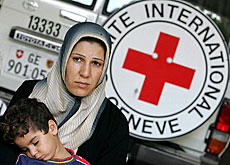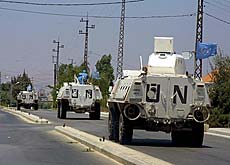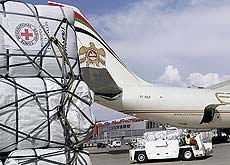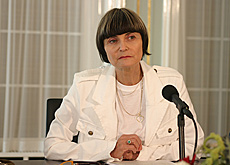Swiss aid struggles to get through in Lebanon

Ongoing fighting in Lebanon is hindering the distribution of emergency supplies warn Swiss experts, while providing shelter for refugees is proving complicated.
This is especially true in the south of the country, where the heaviest exchanges of fire between Israelis and Hezbollah militia have taken place.
According to the Geneva-based International Committee of the Red Cross (ICRC), the situation in Lebanon is nothing less than a humanitarian emergency.
The organisation estimates that almost one million people – around a quarter of the population – have been displaced by this conflict. And with fighting continuing, distribution of emergency supplies remains problematic for all aid specialists.
“The situation remains uncertain at the moment and this war could go on for some time, which complicates no end planning aid for displaced people,” said Toni Frisch, head of the Swiss Humanitarian Aid Unit (SHA).
The uncertainty has led the Swiss to re-evaluate how they should provide aid in the area. One proposal is the so-called Cash for Shelter concept, whereby refugees stay with other residents in exchange for cash.
The Lebanese government has said it is interested in the plan, and Frisch reckons a pilot project could be underway within the next two weeks.
“This solution would allow us to put up tens of thousands of people with relatively little work and without using equipment,” he said.
Swiss specialists and the Lebanese authorities have been evaluating sites for tent camps outside Beirut. So far, only one camp for about 100 families has been set up in the capital.
“It’s easy to pitch a tent, but it’s more difficult to evaluate where to set up a camp and what its needs will be in the medium and long-term future with a military situation that can evolve very quickly,” added Frisch.
Distribution of first-aid kits and medication is underway, but is proceeding slowly because of security concerns and heavy fighting in southern Lebanon near the Israeli border.
Falling population
For the ICRC, which has been running relief operations in the area since the conflict began, their mission has changed little in the past week.
In the Tyre region, which has come under heavy attack, the population has fallen dramatically, dropping to 100,000 according to the ICRC. The city itself only has one tenth of its inhabitants remaining.
“When air raids were suspended for 48 hours, a lot of people took the opportunity to throw a few things in their cars and leave as quickly as possible,” said Roland Huguenin, the ICRC spokesman in Tyre.
“We insist that those remaining are civilians who for the most part have no way of leaving.”
But for those who are left, the organisation has continued organising convoys to deliver fuel for generators and food. “In Tyre for example, there are almost no shops open and it’s a city that is literally under siege,” Huguenin told swissinfo.
The whole country has been under a blockade since Beirut airport was shut down and ships were told not to dock in Lebanon.
The ICRC has managed however to get authorisations for a few vessels carrying emergency aid and supplies. It was able to land 100 tons of food in Tyre, Lebanon’s fourth largest city, on Wednesday.
While this is a major improvement as far the ICRC is concerned, overcoming the difficulty of using slow-moving road convoys, it may not prove to be enough.
“The arrival of more ships is critical since we need to bring in more food every few days to replace the stocks that have been used up,” admitted Huguenin.
Oil slick
Switzerland is also looking to help clean up some of the environmental damage inflicted by the conflict. It is co-financing an evaluation of the pollution caused two weeks ago after Israeli warplanes hit a coastal power plant south of Beirut.
The equivalent of around 110,000 barrels of oil poured into the Mediterranean. The oil has slicked about one third of Lebanon’s coast, an 80-kilometre stretch centred on the plant.
The pollution has also drifted out into the Mediterranean, already hitting neighbouring Syria, with experts warning that Cyprus, Turkey and even Greece could be affected.
The Israeli naval blockade and continuing military operations have made any cleanup impossible so far. Environmental officials say the longer the problem is allowed to go unchecked, the greater the lasting damage.
Switzerland is providing an expert for the evaluation, but the UN team has yet to begin its work because of security concerns.
swissinfo with agencies
Since the beginning of fighting between Israeli forces and the Hezbollah militia on July 13, Switzerland has given the ICRC SFr5.2 million for relief work in Lebanon.
Switzerland has also sent 800 kilograms of medication and seven tons of supplies, along with a dozen humanitarian specialists.
920 Swiss have been evacuated from Lebanon, including 15 in a final operation on Wednesday.
Israel launched its attack against Hezbollah after the Islamic militia kidnapped two of its soldiers.
The Lebanese authorities say that more than 900 people have been killed and 3,000 injured in the three weeks of fighting.
During the same period, 67 Israelis have been killed, 41 of them soldiers slain in fighting and 26 civilians killed in Hezbollah rocket attacks.

In compliance with the JTI standards
More: SWI swissinfo.ch certified by the Journalism Trust Initiative




You can find an overview of ongoing debates with our journalists here. Please join us!
If you want to start a conversation about a topic raised in this article or want to report factual errors, email us at english@swissinfo.ch.